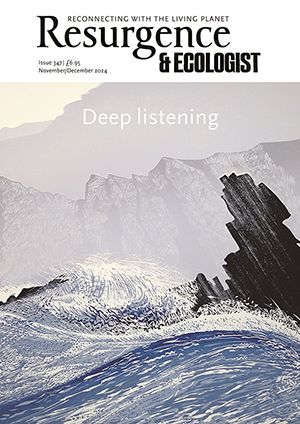Dancing around the edges of burnout seems like a permanent state for many of us. Whether we are parents, unpaid carers, worried about finances and world atrocities, going through relationship issues or health problems, fatigue and exhaustion are widespread. If everything goes OK, we stay in survival mode and can just about keep the show on the road, but if not, the collapse of burnout threatens.
In Radical Rest, Evie Muir states that we are collectively “disenfranchised and resentful, weary and depressed … With no opportunity to process these emotions, they are rendering us numb and inactive, too exhausted to revolt.” Burnout affects us physically, for example by changing the structures of the brain and causing cognitive impairment, mimicking neurological symptoms associated with post-traumatic stress disorder. A central message of this book is that this isn’t our personal failing as individuals, but rather a systemic problem in a society that values economic productivity and ‘business as usual’ above all else.
Muir writes from personal experience of having experienced burnout, and was still living in precarious recovery while creating the book. Visceral, raw stories are shared as past trauma is unpicked. As the founder of Peaks of Colour, a Nature-based walking community based in the Peak District by and for people of colour, Muir offers a Black feminist and Nature-allied lens to consider burnout.
This book challenged my own limited, self-centred notions of the issues. I had not previously stopped to consider that this exhaustion is both gendered and racialised. Muir explains that Black, queer and disabled activists are disproportionally affected by burnout, and seeks to represent these diverse views and different experiences.
I was shocked by the “sleep gap”. Over generations, marginalised communities have been deprived of sleep, in order to maximise their labour, as slaves, or because of fear – for example, enslaved women fearing being sexually assaulted by white men while they slept. This is a pattern still seen, with “racialised communities working disproportionately long hours in numerous, precarious, low-salaried, insecure or unstructured jobs”. A US study concluded that “Black people were five times more likely than white people to get less than six hours of sleep a night.”
The pandemic looms large in our collective past as a huge stressor on our minds and bodies, leading to an increase in burnout today. Muir explains that “two years of hypervigilance, health anxiety and fear” should have been “our call to arms. It should have been an opportunity for change, a real questioning of the ways our global and local communities had been operating, and an invitation to develop a society that is both safe and hospitable for people and planet.” But no, there was a rush for a return to normalcy, as if it was an ideal, and no space left for genuine change or to rethink the accepted ways of existing.
The chapters take us on an “emotion-centred” journey from the negative, such as exhaustion, grief and rage, to the positive, including abundance, joy and rest. There are many stark and illuminating truths – such as the discussion about how little space we make in our lives for grief, and how our education system is failing children as it attempts to condition them for a capitalist existence despite increasing mental health impacts. Perhaps most moving is the chapter on anxiety, where Muir heart-breakingly admits, “I don’t remember a time that preceded anxiousness.”
This is one of the most thought-provoking books I’ve read in a long time. It should be compulsory reading for all policymakers. It’s honest, and blunt at times, but Muir’s voice is warm and accessible. There is no single quick fix to the systemic issues exposed, but this is nonetheless a manifesto of hope.
Radical Rest: Notes on Burnout, Healing and Hopeful Futures by Evie Muir. Elliott & Thompson, 2024. ISBN: 9781783967650







